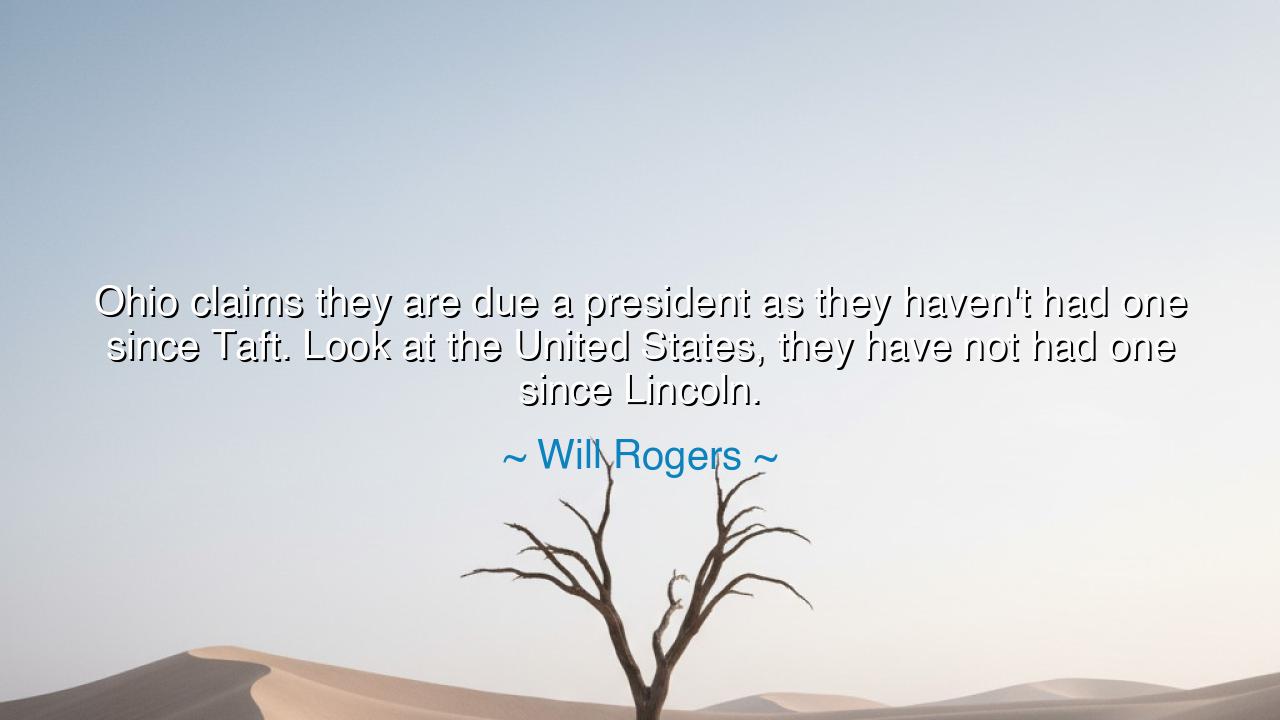
Ohio claims they are due a president as they haven't had one
Ohio claims they are due a president as they haven't had one since Taft. Look at the United States, they have not had one since Lincoln.






"Ohio claims they are due a president as they haven't had one since Taft. Look at the United States, they have not had one since Lincoln." Thus spoke Will Rogers, the great American humorist and philosopher, whose laughter often carried more truth than the speeches of a hundred politicians. Beneath his humor lies a piercing blade of wisdom, sharp and enduring. With a single jest, he captured the weariness of a nation that had grown skeptical of its leaders, and the longing for a time when integrity, humility, and moral courage still walked hand in hand with power. Rogers’s wit, though playful, is the voice of an ancient truth — that the greatness of a nation does not rest in its wealth or its wars, but in the character of its leadership.
When Rogers spoke these words in the early 20th century, America was already deep into an age of ambition and expansion. Ohio, once proud as the birthplace of presidents — Grant, Hayes, Garfield, McKinley, Taft, and others — claimed that destiny itself owed them another. But Rogers, ever the lover of irony, turned their boast upon the entire nation. “You say Ohio deserves a president?” he quipped. “Then what does the United States deserve, when it has not had a real one since Lincoln?” In that playful reversal, he delivered a timeless verdict: that true statesmanship had grown rare, that public office had become a profession rather than a calling, and that the spirit of Lincoln — selfless, steady, and pure — had long since vanished from the halls of power.
The meaning of Rogers’s words runs far deeper than satire. He was not merely mocking Ohio’s pride or the politicians of his day; he was mourning a decline in virtue. To him, government had become a stage, and politicians its actors — skilled at posing for applause but unwilling to bear the burden of truth. He contrasted this spectacle with the figure of Abraham Lincoln, the man who rose from hardship to greatness not by cleverness, but by conscience. Rogers’s humor, like a folk prophet’s parable, reminds us that the measure of leadership is not in eloquence, wealth, or origin, but in moral strength — in the willingness to serve rather than be served, to suffer rather than deceive.
Consider the life of Lincoln, the standard against which Rogers measured all who came after. Lincoln, born in a log cabin and educated by the firelight of his own perseverance, carried into the presidency no arrogance, only duty. In the darkest hour of the Union, when war tore the land and brother fought brother, he governed not with pride, but with sorrowful conviction. He never sought glory; he sought peace through justice. And even as he bore the hatred of foes and the exhaustion of friends, he stood unbroken — gentle yet firm, humble yet strong. Such was the man Rogers held above all others, the man whose honesty and humanity had become the lost ideal of American politics.
Rogers’s lament for Lincoln’s absence was not nostalgia — it was a warning. He saw that when leadership becomes detached from virtue, nations begin to drift. When presidents seek fame instead of service, when they speak of unity but sow division, when they promise prosperity yet forget compassion, the people’s faith erodes, and democracy itself begins to hollow out. Rogers knew that the soul of a republic cannot survive long on laws and systems alone; it must be nourished by character. Without men and women of conscience to guide it, government becomes an engine without a driver — powerful, but dangerous.
The lesson that Rogers gives us is one both humbling and urgent. It reminds us that we should not look to titles or parties to find greatness, but to the content of character. Every age must guard against complacency — against the belief that greatness will come automatically, or that virtue can be replaced by cleverness. The legacy of Lincoln cannot live in marble statues or speeches alone; it must live in the hearts of those who demand integrity from their leaders and from themselves. For as Rogers’s jest suggests, the distance between a nation’s ideals and its actions grows whenever the people cease to expect more.
And so, the wisdom of Will Rogers endures, hidden in laughter but crowned with truth. His words remind us that humor is not the opposite of seriousness — it is its companion, the mirror that reveals what solemnity hides. To laugh at folly is to see it clearly; to recognize decay is the first step toward renewal. Let us, then, not merely admire Lincoln, but emulate him. Let us seek honesty in place of ambition, humility in place of pride, and compassion in place of cunning. For if we, the people, become again what he once was, then we may yet raise up leaders worthy of his name — and perhaps one day, when the spirit of Lincoln walks among us once more, the United States will at last have a president again.






AAdministratorAdministrator
Welcome, honored guests. Please leave a comment, we will respond soon